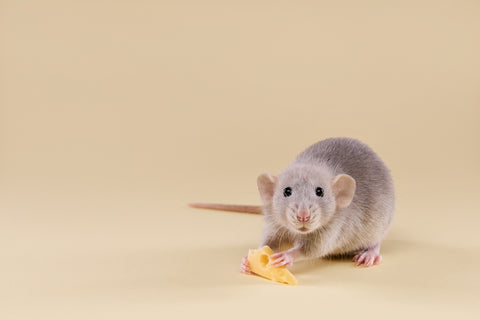Mice are omnivores, which means they eat quite a broad range of foods, from seeds and grains to meat and insects.
And that’s just one of the reasons why they can cause such havoc inside a home – they’ll eat almost anything they can get their paws on.
But what do mice eat, specifically?
You might have questions about the specific kinds of foods that these little critters can’t resist, as well as which foods you should try to avoid leaving out if you want to avoid a mouse infestation.
Well, this guide is here to answer them.
Below, we’ll take a deep dive into what mice eat, exploring their favorite foods and highlighting some of the more surprising snacks they don’t mind chowing down on.

What Do Mice Eat in the Wild?
Before we dig into the typical household snacks and human foods mice like to eat, let’s take a look at their natural diet, out in the wilderness.
Below are the kinds of foods that field mice and deer mice enjoy eating.
Seeds and Grains
Mice love seeds and grains. In terms of their favorite foods, there are few snacks that can compete with the likes of sunflower seeds and wheat.
Such foods are packed full of energy, perfect for helping mice remain active and forage for more food without getting tired.
Grasses and Plant Matter
Mice will also eat lots of grasses out in the wild, which is why many of them can be found living in plains, fields, and meadows.
They eat lots of plants, too, including roots, leaves, and stems to give them moisture and various nutrients.
Fruits and Veggies
If mice are lucky enough to live near farmland or area where fruits and veggies grow in the wild, they’ll regularly raid the fields for a daily snack.
They can enjoy all sorts of fruits and veggies, from apples to carrots, and get various nutritional benefits from the vitamins and minerals within.
Insects
As stated earlier, mice are omnivores, so they won’t just eat plant matter. They’ll also munch on bugs and small invertebrates of varying species.
Insects are a super source of protein, helping mice develop stronger muscles and grow bigger.

What Do House Mice Eat?
We’ve covered the basics of what mice tend to eat when they’re living among shrubs and fields. But what about when they sneak inside a home?
Well, house mice are notorious for their diverse diets, including common human foods.
Processed Foods
Mice love all the processed food found in typical kitchens across the country just as much as people.
That goes for bread, breakfast cereal, and even candy bars, too. These items often have strong smells that draw mice near – a good mouse repellent strategy is to seal such foods in airtight containers.
Crumbs and Leftovers
Most people leave some food behind after eating, like leftovers that get dumped in the trash can, or crumbs that accidentally fall on the floor.
Well, they may seem small and insignificant, but they can represent a big dose of calories for teeny tiny mice. Mice will often scurry across kitchen floors or dining areas, nibbling up any crumbs they come across.
Meat
Thanks to their omnivorous nature, mice have no qualms about eating meat. In fact, they’re quite strongly attracted to the odor given off by fatty and greasy meat,
For that reason, bacon and sausage are recommended baits if you’re preparing a trap or some other mice killer device.
Cheese
It’s the classic cartoon image, a mouse sniffing out a piece of cheese. Well, there’s a reason why that idea is so well-known – mice really do like cheese.
It’s not exactly their favorite food, nor is it the best bait for mouse traps, but mice certainly won’t say no if they spot a wedge of cheddar or some other flavorful cheese left lying around.
Pet Food
While cheese may not be a mouse’s favorite food, pet food is definitely one of their top options. That applies to dry food, like dog kibble, as well as wet food, like cans of cat food containing pieces of meat or fish.
Pet food smells strong, and mice use their powerful sense of smell to forage for snacks. So, leaving pet food bags open is one of the worst things to do if you’re trying to keep mice away.
Birdseed
Food intended for cats and dogs isn’t the only animal-related snack that mice will actively seek out. They also love birdseed, since kit contains many of the same seeds and grains they tend to enjoy in the wild.
That’s why mice are often more likely to enter homes that have bird feeders right outside – they’ll visit the feeder first and then gradually move indoors in search of additional treats.
Honey
Honey can be a little divisive among humans, with some people liking it and others hating it.
Well, it’s a similar story with mice. Some breeds will ignore honey entirely, but others really love the stuff. It’s a rich source of sugar, which can give mice a massive burst of energy. Nectar, too, is often popular with most mouse species.
Peanut Butter
Love spreading peanut butter on your sandwiches or adding it to your favorite bakes? Well, make sure to seal up the jar when you’re done. Otherwise, a mouse might scurry inside and help itself.
This butter (and other nut butters) is rich in protein and fat, so it’s a super nutrient source for mice. Since it’s so sticky, it’s a decent option to add to traps and mice control products.
Sweet Treats
Some mice have a sweet tooth, just like people. And honey isn’t the only sweet treat they’ll seek out. They’ll also eat chocolate – they tend to favor milk over dark – as well as marshmallows and even pieces of candy.
If you’re a fan of sweet stuff, it’s best to seal it away if you want to avoid accidentally luring mice into the home.
Dried Fruit
While mice love fresh fruit and veggies most, they’ll also happily chow down on dried pieces of fruit. This includes the likes of raisins and dried apricots or apple slices.
These kinds of foods tend to emit a sweet and enticing aroma that draws mice near, and they’ve got lots of calories and energy inside.
Commonly-Asked Questions About What Mice Eat
Now we’ve covered the basics of what mice eat, you may still have some questions about specific foods or dietary habits.
Here are some of the most commonly-asked questions relating to the dietary habits of mice.
Do Mice Eat Ants?
Yes, ants are among the insects and small invertebrates that mice may eat. They don’t rank among the most common mouse foods, but they’re certainly not off the menu.
If a hungry mouse comes across some ants while foraging, it won’t hesitate to gobble them up. However, if the mouse already has a good supply of other foods, it’ll usually ignore ants in favor of tastier options.
Do Mice Eat Spiders?
Spiders are also a possible option. Just like with ants, spiders aren’t among a mouse’s favored or most-eaten food choices, but will be considered if there isn’t much else available.
Field mice, out in the wild, for example, are likely to consume spiders if they can’t find enough grains and seeds to sustain themselves in the local environment.
Do Mice Eat Cockroaches?
Mice tend to prefer seeds and grains most of the time. But if they’re hungry and desperate, they’ll absolutely be willing to eat roaches. Roaches, like other bugs, are a solid source of protein to help a mouse’s development.
However, you certainly can’t count on mice to control a roach problem, and it’s important to take relevant action if you spot the signs of roaches, mice, or both in your home.
Do Mice Eat Each Other?
Will mice eat each other? Well, it’s not really in their nature. They won’t usually eat other mice and mainly prefer plant-based foods like seeds, grains, and fruit.
However, as a last resort in desperate times, a mouse may eat another mouse. This could happen in any of the following circumstances:
- Territory Disputes: Mice are territorial creatures and won’t hesitate to defend their turf if they feel that other mice are moving in on them. If an area is getting overcrowded, mice might get become aggressive, attack, and even eat other mice. They’ll especially target younger mice or babies to assert their dominance.
- No Food: Just like a lot of other animals, mice can get desperate when they don’t have any food. If they’re starving and weak, unable to find anything when they forage, they can potentially eat other mice. Again, they’ll usually target the younger and weaker mice, as they’ll be easier to overpower and consume.
- Excessive Stress and Anxiety: Again, like a lot of other animals, when mice are exposed to highly stressful or scary situations, they can resort to desperate measures, including cannibalism. This has been noticed on laboratory mice, which can lash out and become aggressive due to the traumatic conditions in which they are kept.
Do Mice Eat Insulation?
If you have mice in your attic, you may be worried about them nibbling their way through the insulation.
And it’s true that mice may sometimes gnaw through insulating materials, particularly those made of natural fibers.
They won’t actually eat it, but they can gnaw it and use it to nest in, as it keeps them nice and warm and can provide a safe space to raise their young.
Why Do Mice Chew on Wires?
Mice chewing on wires is another common issue that a lot of homeowners have to deal with.
It’s one of the most frustrating aspects of having a mouse infestation, and mice can do serious damage to a home’s electrical system if they bite through key wires in the walls.
As to the reason why, it’s simply part of their natural instinct.
Rodents like to nibble, chew, and gnaw on things they find, and mice teeth keep on growing throughout their lives. So they have to bite things to keep the teeth short and healthy.
Wires are far from the only things that mice might bite while inside a home. They can also nibble inside the walls and gnaw wooden furniture or bits of paper, card, and fabric they find while foraging and exploring the house.

What’s the Best Food to Use as Bait?
If you want to catch mice in traps, it’s best to prepare them with an effective type of bait. And when it comes to picking the best bait, you’ll want to focus on foods that have strong smells to attract mice to them.
Some of the best options include cheese, peanut butter, fatty meats (like bacon), seeds, nuts, and grains, as they all have strong and enticing smells.
Use the Best Mice Repellent to Prevent Infestations
Overall, mice will eat quite a lot of different foods. That’s especially true for house mice, which are particularly curious and confident, always foraging, exploring, and nibbling at crumbs and leftovers they find along the way or food they find left out in the kitchen or pantry.
Fortunately, you can use a mouse’s love for food against it!
Many of the best mouse repellent products, like mouse repellent spray, are designed with key mouse deterrent ingredients and aromatic foods that mice hate, like cinnamon, as well as other spices, herbs, and essential oils.


